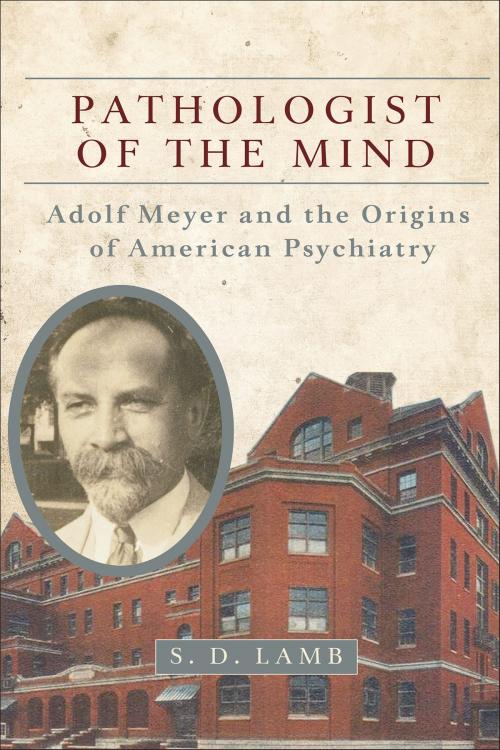Pathologist of the Mind
Adolf Meyer and the Origins of American Psychiatry
Nonfiction, Health & Well Being, Medical, Reference, History, Specialties, Psychiatry| Author: | S. D. Lamb | ISBN: | 9781421414850 |
| Publisher: | Johns Hopkins University Press | Publication: | November 20, 2014 |
| Imprint: | Language: | English |
| Author: | S. D. Lamb |
| ISBN: | 9781421414850 |
| Publisher: | Johns Hopkins University Press |
| Publication: | November 20, 2014 |
| Imprint: | |
| Language: | English |
During the first half of the twentieth century, Adolf Meyer was the most authoritative and influential psychiatrist in the United States. In 1908, when the Johns Hopkins Hospital established the first American university clinic devoted to psychiatry—still a nascent medical specialty at the time—Meyer was selected to oversee the enterprise. The Henry Phipps Psychiatric Clinic opened in 1913, and Meyer served as psychiatrist-in-chief at Johns Hopkins until 1941.
In Pathologist of the Mind, S. D. Lamb explores how Meyer used his powerful position to establish psychiatry as a clinical science that operated like the other specialties at the country’s foremost medical school and research hospital. In addition to successfully arguing for a scientific and biological approach to mental illness, Meyer held extraordinary sway over state policies regarding the certification of psychiatrists. He also trained hundreds of specialists who ultimately occupied leadership positions and made significant contributions in psychiatry, neurology, experimental psychology, social work, and public health.
Although historians have long recognized Meyer’s authority, his concepts and methods have never before received a systematic historical analysis. Pathologist of the Mind aims to rediscover Meyerian psychiatry by eavesdropping on Meyer’s informal and intimate conversations with patients and colleagues. Weaving together private correspondence and uniquely detailed case histories, Lamb examines Meyer’s efforts to institute a clinical science of psychiatry in the United States—one that harmonized the expectations of scientific medicine with his concept of the person as a biological organism and mental illness as an adaptive failure. The first historian ever granted access to these exceptional medical records, Lamb offers a compelling new perspective on the integral but misunderstood legacy of Adolf Meyer.
During the first half of the twentieth century, Adolf Meyer was the most authoritative and influential psychiatrist in the United States. In 1908, when the Johns Hopkins Hospital established the first American university clinic devoted to psychiatry—still a nascent medical specialty at the time—Meyer was selected to oversee the enterprise. The Henry Phipps Psychiatric Clinic opened in 1913, and Meyer served as psychiatrist-in-chief at Johns Hopkins until 1941.
In Pathologist of the Mind, S. D. Lamb explores how Meyer used his powerful position to establish psychiatry as a clinical science that operated like the other specialties at the country’s foremost medical school and research hospital. In addition to successfully arguing for a scientific and biological approach to mental illness, Meyer held extraordinary sway over state policies regarding the certification of psychiatrists. He also trained hundreds of specialists who ultimately occupied leadership positions and made significant contributions in psychiatry, neurology, experimental psychology, social work, and public health.
Although historians have long recognized Meyer’s authority, his concepts and methods have never before received a systematic historical analysis. Pathologist of the Mind aims to rediscover Meyerian psychiatry by eavesdropping on Meyer’s informal and intimate conversations with patients and colleagues. Weaving together private correspondence and uniquely detailed case histories, Lamb examines Meyer’s efforts to institute a clinical science of psychiatry in the United States—one that harmonized the expectations of scientific medicine with his concept of the person as a biological organism and mental illness as an adaptive failure. The first historian ever granted access to these exceptional medical records, Lamb offers a compelling new perspective on the integral but misunderstood legacy of Adolf Meyer.















